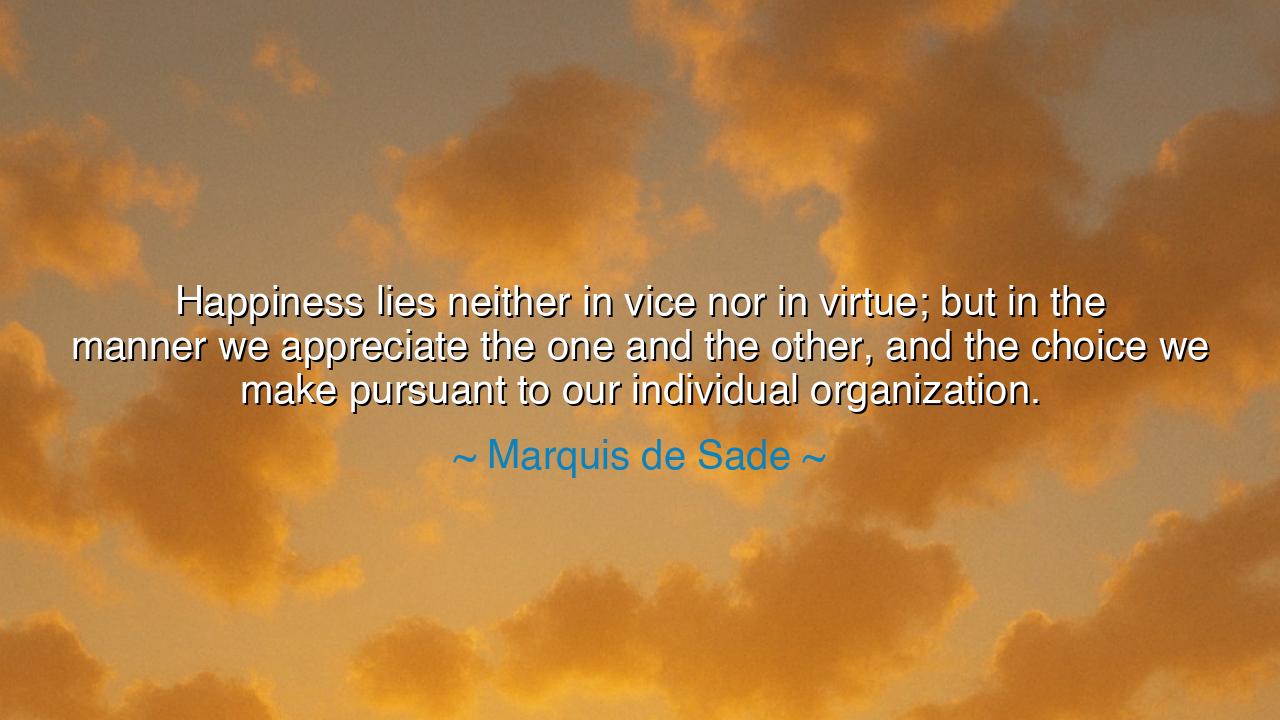
Happiness lies neither in vice nor in virtue; but in the manner
Happiness lies neither in vice nor in virtue; but in the manner we appreciate the one and the other, and the choice we make pursuant to our individual organization.






“Happiness lies neither in vice nor in virtue; but in the manner we appreciate the one and the other, and the choice we make pursuant to our individual organization.” Thus spoke the Marquis de Sade, that most controversial of philosophers, who in his strange and turbulent life sought to uncover not the surface morality of mankind, but its hidden essence. In this profound reflection, he does not praise wickedness nor condemn virtue; rather, he reveals that happiness cannot be found in rigid moral categories, but in the harmony between one’s inner nature and one’s choices. To the Marquis, human joy is not bestowed by divine decree or societal rule — it is born from understanding oneself, from living according to one’s own truth, whether the world calls it good or evil.
The origin of this quote lies in the paradoxical philosophy of Donatien Alphonse François, the Marquis de Sade, a man imprisoned for much of his life, both literally and morally, for his defiance of convention. Writing in the shadow of Enlightenment reason and the storm of the French Revolution, de Sade challenged the moral foundations of his age. He questioned whether virtue was truly virtuous if practiced only from fear, and whether vice was truly evil if it sprang from nature itself. Thus, in saying that happiness lies not in vice or virtue, he rejects the notion that morality alone defines fulfillment. Instead, he declares that the appreciation and balance of both, according to one’s own temperament, form the root of personal peace. For each soul, he believed, is organized differently, and therefore must find joy not in conformity, but in self-knowledge.
To understand his meaning, one must look beyond scandal to the timeless struggle between duty and desire that dwells in every human heart. De Sade’s insight is that neither extreme — pure virtue nor pure vice — brings happiness. The one suffocates the spirit in restraint; the other devours it in indulgence. True contentment, he suggests, arises when a person perceives both forces clearly and chooses the path that aligns with their nature. This echoes the ancient wisdom of Aristotle, who taught that virtue lies in balance, in the “golden mean” between excess and deficiency. Yet de Sade extends this balance beyond universal ethics to the level of individuality: what is temperance for one may be torment for another. Thus, happiness is not a formula, but an art, a personal music composed by the harmony of one’s instincts and reason.
Consider, for example, the story of Gautama Buddha, who, before his enlightenment, lived first in luxury and then in severe asceticism. He found neither to bring peace. It was only when he renounced both extremes — the indulgence of vice and the denial of virtue — that he discovered the Middle Way, and with it, serenity. His revelation mirrors the essence of de Sade’s teaching: that happiness does not belong to extremes, but to understanding, to the conscious appreciation of life’s dualities. The Buddha found balance by seeing both pleasure and virtue not as masters, but as instruments, and by choosing, as de Sade says, “pursuant to his individual organization.”
The courage to know oneself is the foundation of this philosophy. The world urges men and women to fit molds — to seek virtue as others define it, or to rebel through vice without reflection. But de Sade, for all his flaws, challenges the soul to listen inwardly. He reminds us that to imitate virtue without conviction is hypocrisy, and to indulge vice without awareness is slavery. Freedom, and thus happiness, is born when one acts not from fear or imitation, but from understanding one’s true inclinations — from acknowledging both the light and the shadow within. For the one who knows himself cannot be enslaved by the judgment of others; his joy comes from within, not from approval.
And yet, this teaching demands wisdom, for it can lead the foolish astray. To follow one’s nature is not to abandon conscience, but to refine it. The one who mistakes impulse for authenticity, who pursues pleasure without awareness, will destroy both body and soul. De Sade’s true meaning lies not in indulgence, but in clarity — in the power to perceive one’s desires and virtues alike as parts of a greater whole. The wise do not suppress their passions, nor are they consumed by them; they learn to appreciate them, to channel their energy into a life that expresses their deepest truth without harming the harmony of others.
So, dear listener, take from this paradoxical philosopher a lesson for your own path: Seek not to be good according to the world, nor wicked in defiance of it — seek to be true. Do not fear your desires, nor worship them. Instead, study them as a scholar studies the stars, and let their constellations guide you toward balance. The happiness you seek is not in denying life, nor in drowning in it, but in understanding the rhythm of your own heart.
For as the Marquis de Sade teaches, happiness is neither the crown of the saint nor the trophy of the sinner, but the reward of the self-aware soul — the one who dares to see the whole of his nature and to live in harmony with it. The world may never understand such a person, but that is of no matter. For he who has discovered his own equilibrium — between virtue and vice, reason and passion — has found the only kingdom that cannot fall: the kingdom of himself.






AAdministratorAdministrator
Welcome, honored guests. Please leave a comment, we will respond soon